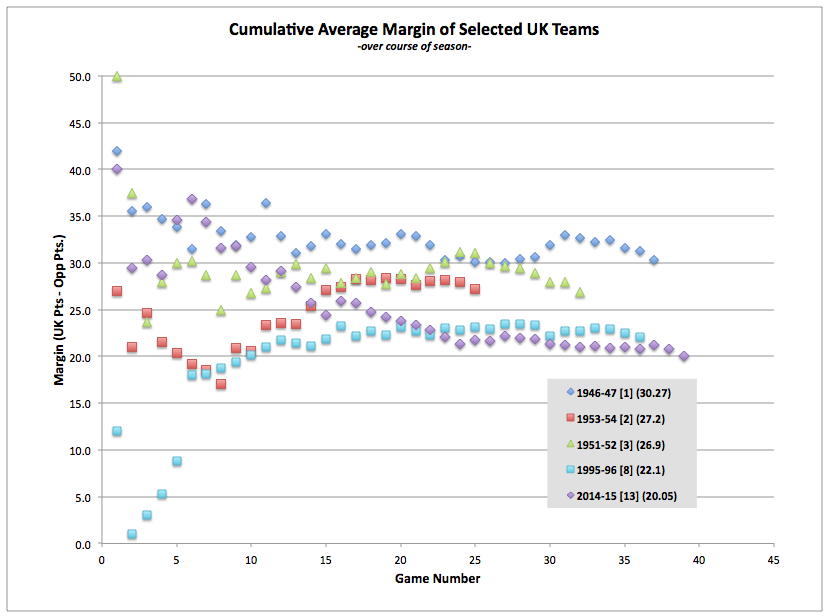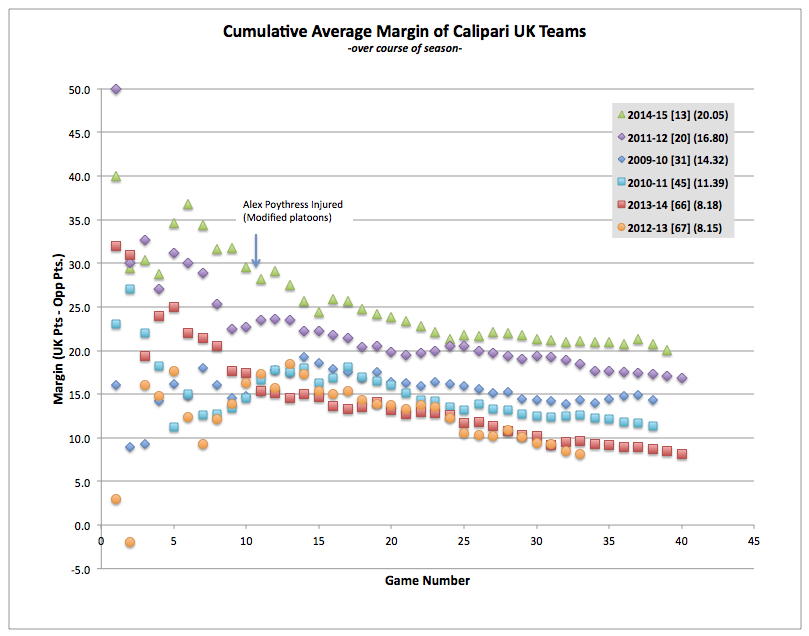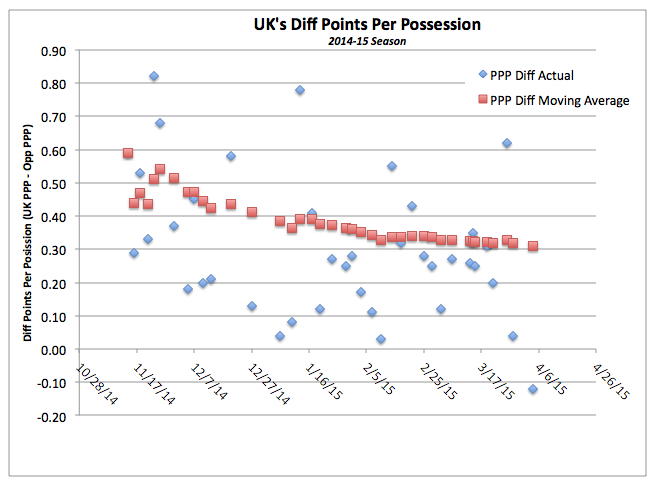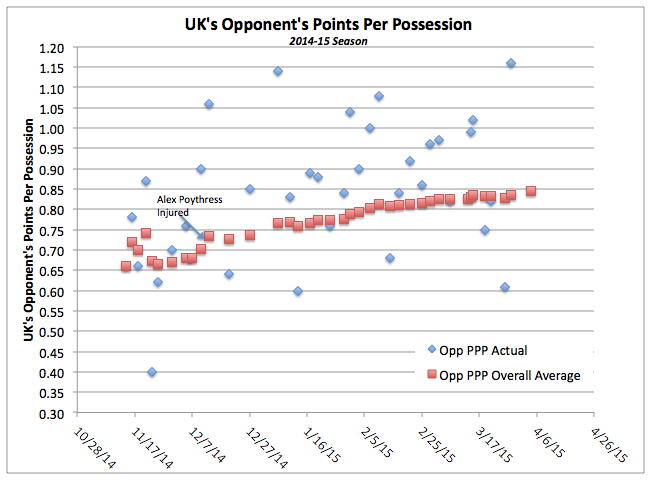I understand what you are saying, but what I noticed that season is that for a good chunk of the season he used the platoon system at least at the beginning of the game, and according to what you are saying this is true. So the abandonment of the system started happening during the game, and then eventually total abandonment to where he didn't even try to use it. My assertion is that Cal may have decided later in the season that the platoon system wasn't working like it did earlier in the season, and thus decided against using it. And as such, the lack of dominance is what actually caused the abandonment of the system.
From a coaching perspective, when you see a train jump the tracks, you don't have to wait until the train crashes to know it's gonna wreck. Thus if there were things that Cal saw early in some of those games that indicated to him that his chances of winning those games would decrease by sticking to the platoon, he would likely scrap the system mid game, which is what we saw, before completely scrapping the system.
I see what you're saying, and it sounds like we largely agree on the fact that as the season progressed Cal used the platoons less and less. First after Alex's injury he started using what I'd call modified platoons (for another ~10 games), and as the season went on the duration of using platoons (whether straight or modified) became less and less a part of the total game.
Seems like we view this as a chicken and egg question. But as I've said already, I was watching Cal's substitution pattern real time during the season and until it became more trouble than it was worth was charting the substitution pattern of each game, and at least to me it was obvious that the more Cal went away from platoons, the less effectively the team played overall. [i.e. once Cal started substituting individual players, the team no longer looked completely coherent (especially defensively) and became more disjointed, which only prompted Cal to substitute more.] It was a vicious cycle, and frankly infuriating to watch.
Now part of the issue with assessing how effective platoons are is not based on an individual cycle. (i.e. you can look at one rotation and expect that they will have a positive +/- each time.) Where the platoons really proved their worth was about midway in the second half of the game when after constant pressure on the opposing team, UK would go on a run and the other team simply gave up out of frustration and exhaustion.
But the shorter Cal actually used platoons during the game, the less valid was it to assess how they actually worked over the course of the entire game. Regardless, when you step back and look at the overall stats, it was clear that playing platoons only was far dominant to some combination of platoons + individual substitution.
I do think that it's to be expected that as the season progressed, that opponents would adopt and be better prepared to face UK. For example, they certainly should have learned from some of the early blowouts not to try to run with UK, but instead to try to slow the pace down.
Unfortunately it seems to me that instead of really investing in the platoon system and improving it during the course of the season, that Calipari abandoned it too soon.
As an example, early in the season I kind of envisioned that the two UK squads would be developed in a way that they played completely diffrent styles. The "Blue" team with say the Harrisons, KAT etc. would be more bruising, pound it out, like a boxer hitting an opponent repeatedly with body blows.
Then the "White" team with Ulis, Booker etc. would be more run and gun, pressing and shooting threes, trying to force the pace, like a boxer coming out dancing around the ring and trying to land a flurry of jabs.
You could actually have had each team adopted by different assistants (i.e. one under Robic, one under Kenny Payne) and have them develop some of their own sets and plays.
To me it would be hard enough for an opponent to prepare for one of those squads, let alone two with completely different styles and game pace. (especially in the NCAA tournament when there isn't a lot of free time to prepare for future opponents). But sadly, this never seemed to be developed to the extent I would have liked to see.
I'm not saying which came first, because as fans, our knowledge of the game while high compared to other fanbases, is still low compared to a HOF coach. The only way to actually prove the theory would be to have a single game played both ways and compare the outcome. Unfortunately, that does not exist. Even comparing two separate games against the same team in which one style was used one game, and the other used the next, there are still too many factors to point to the difference actually being the style. And that actually goes for the entire argument. Even if the substitution pattern was the only thing that changed over the course of the season, it still would not definitively prove the theory. Something happened that year during their Christmas break around the first of the year that changed that team. Maybe substitution pattern change is it, though I'm not ready to say it was. They still platooned after that, and it was obvious that their overall effectiveness went down.
We will likely never know the real reason it stopped. Was word from the recruiting world getting back to Cal? Did he start dreaming of that undefeated season and make hasty decisions trying to keep it in tack? Did he just get scared? Did there start to be some player issues with playing time? Did somebody's draft stock start falling and he tried to recover it? Or was it something else totally?
I think certainly some feedback from recruits caused some sort of crises in confidence by Cal. And I firmly believe that was a mistake on his part.
Cal has been able to take facts like Anthony Davis and MKG took the 4th and 5th most shots on the 2012 team and still were drafted 1st and 2nd to great effect. I don't know why he wouldn't be able to take the fact that yes, some players sacrificed minutes during the 2014-15 season but it helped the overall team and it didn't hamper their pro prospects (including guys like Devin Booker and Trey Lyles who might otherwise have been buried on the bench), and turn that into a positive on the recruiting trail.
I think there was also some comments Cal made during the season about people on the bench not working hard enough to deserve to be on the floor. I'm not sure who exactly he was talking about, but if so that's on them.
One example is Derek Willis. I said at the time that Alex Poythress went down with injury that Derek Willis was probably the most important player on the 2014-15 team. The reason being that if he could step in and take Poythress' spot and maintain pure platoons, the whole team would benefit.
Instead, he wasn't mentally ready to do that. (After the most recent season he was interviewed and admitted that despite playing great in the Bahamas, he wasn't mentally ready to be a major contributor that year, which was disappointing to hear. He was a year too late.)
Dominque Hawkins filled in as a third guard in some games, and as I said the team still played really well in those post-Poythress injury games where full platoons were still maintained, but eventually that was the chink that led Cal down the road to start experimenting with the lineup, and the team never performed as well again (except in a few cases like WVU etc. where they were clearly motivated to dominate).
As you suggest, there may have been other reasons that we're not aware of which led Cal to change his strategy during the season.
But regardless of the reason, the fact was that it was obvious DURING the season that the more Cal went away from platoons, the worse the team played. A Hall of Fame caliber coach should have noticed that and corrected it IMO.
And BTW, another person I blame for not correcting that was Joel Justus. If you remember he was hired that season specifically to be the 'Advanced Analytics' guy. I'm not sure what he was doing but that's the type of thing he should have picked up on quickly.






